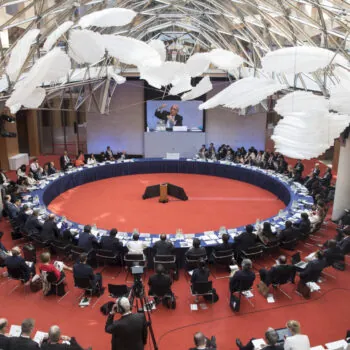To the faint hearted European policy can sometimes come across as an enigma wrapped up in confusion and headache. However, there are moments when sanity and purpose unlock this mire. The European Parliament’s overwhelming support for an immediate intervention in the EU ETS in December 2011 is an example of these pivotal occasions.
Three things stand out about this vote. Firstly, there was overwhelming consensus in support of the need for an intervention in the EU ETS. This was the compromise majority view. Secondly, there is a clear majority favouring the scale of intervention to be at least 1.4bn allowances. Thirdly, and perhaps most importantly, is its political capital which hasn’t gone away unnoticed by Member States and the Commission.
So what is preventing action now? Those against intervention put forward three fragile and conflicting arguments. Firstly, intervention creates uncertainty. This line of thought ignores core fundamentals of the ETS. It is a policy driven market. If it does not deliver the overarching political objective of decarbonisation, modernisation and growth – other policies will come. After all climate change has not gone away. The International Energy Agency in its recent World Energy Outlook indicates that without drastic action within the next 5 years we are on course for an average temperature of 6 degrees above pre-industrial times by the end of the century.
Science tells us that anything beyond a 2 degree rise will be catastrophic. The Commission and Member States are already moving. Germany is legislating to deliver its Energy Concept, the UK has a raft of domestic legislative targets and even Poland is busy exploring unconventional gas and nuclear plants. The Commission has started consulting on the 2030 renewable energy target with a legislative debate to start sooner rather than later. The lack of intervention creates uncertainty.
The second line of argument is that industry will suffer from these actions. This is simply not the case. Virtually all industrial sectors are included on the carbon leakage list and therefore receive nearly all of their allowances for free up to 2020. Vast stockpiles of international offsets have been built up so there is less need to use ETS allowances for compliance. Furthermore, most sectors will also receive financial compensation for the increase in electricity costs. The scandal here is that DG Competition is proposing that these costs should be €30, almost 3 times the current ETS price. This is close to the biggest subsidy ever granted by the EU to industry. It begs the question – if we throw such a large subsidy at industrial sectors why can’t the rest of society also receive similar support in the shape of local non-transferable jobs in energy savings measures, deploying renewable energy technologies or stimulating technological innovation?
The final argument concerns the nature of the intervention itself. This is the easiest to refute. Setting aside allowances does not open up the whole ETS directive. This really would create uncertainty and be counterproductive. Instead, the ETS auctioning regulation is amended which in turn alters the auctioning calendar. All that is required is the option for Member States to opt into a new registry line, which the Commission can create about as quickly as you and I can hit print on our computers. Allowances that Member States wish to bank into a period beyond 2030 are held in this registry. This gives countries the chance to preserve their financial assets and reap a higher reward for them in the future. It also ensures that the ETS will be relevant beyond 2030. As this is an opt-in decision, not all Member States are required to make a contribution. Those with the largest volume of allowances, Germany, Poland and the UK, can agree to put aside their allowances. If a country like Poland wishes to sell all of its allowances by 2020 it is perfectly entitled to do so. But this type of decision cannot undermine the revenues that are needed by counties such as Germany and the UK. The set-aside has direct benefits to countries which are facing severe constraints on finance such as Greece. So it is also part of the solution to the Eurozone crisis. So the case against intervention is, as Macbeth said, “..a tale told by an idiot, full of sound and fury, signifying nothing”.
This commentary was published in Point Carbon on 30th January 2012


